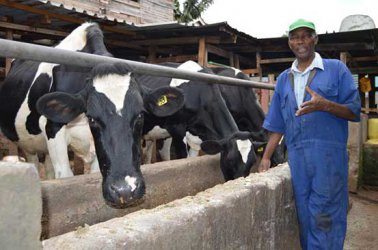Profitable dairy farming in Kenya: For many, a quarter-acre of land may not be enough for any meaningful farming. But for Lawrence Njuguna, it is more than enough to keep 40 dairy cattle. After working as a primary school teacher for years, Mr Njuguna quit to venture into dairy farming. He has never regretted.
It all started in 1982 when he bought two cows for Sh. 2, 000 and spent Sh. 1, 500 to construct a cow shed on his quarter-acre piece of land in Ndenderu village, Kiambu County.
“I was a primary school teacher in Nairobi and I used to pack the milk in my small vehicle to sell it to my colleagues, mostly from the Asian community,” said Njuguna.
The demand for his milk grew and he had to increase the number of cows to satisfy his customers. But his turning point came in 1994 when he retired from his teaching job to concentrate on dairy farming.
That year, Njuguna increased his herd to 60 but was later forced to reduce them due to constraints such as inadequate animal feeds.
Quality breeds
Today, individuals and institutions visit his farm to learn about dairy farming. To improve his skills, Njuguna undertook courses in Artificial Insemination (AI) and fodder management in the US. He also studied Agribusiness Management at the United States International University (USIU) in Nairobi.
Njuguna says he uses quality semen to improve his breed. Currently, he uses semen which costs between Sh. 5, 000 and Sh. 7, 000 to ensure his cattle sire quality heifers.
How I make Sh. 50,000 net profit every month from selling eggs
“Good breeding is important in getting quality heifers which give good results. I use artificial insemination to get good breeds,” the dairy farmer says. The former teacher prefers Fresian cows because they produce more milk and lactate for a long period. The breed is rarely affected by diseases, has good fertility, is resistant to lameness and its milk has a higher protein percentage.
“I tried other breeds but they did not give what I wanted. I had to go back to my Fresians which give me plenty of quality milk,” says Njuguna.
The farmer sells his milk to Kiambaa Dairy Farmers Cooperative Society in the morning. In the evening, he sells it to locals who collect it milk from his home. He, however, says milk prices are not good, as the society only pays Sh. 35 per litre.
On a high season, Njuguna sells at least 400 litres of milk daily to the co-operative society and the local market which offers Sh. 40 per litre, giving him an average of Sh. 16, 000 per day. From this daily income, Njuguna is able to rake in a gross of about Sh. 480,000 per month. In a highly productive year, Njuguna can see his dairy production shoot up to a gross of Sh. 5.7 million.
His advice to dairy farmers? If you want your cows to produce plenty of milk, feed them properly and arrange regular check-ups by veterinary officers, he says.
His smart farm also employs modern technology. Njuguna uses an electric machine to milk the 13 cows currently lactating.
“This makes my work efficient and easy to undertake. I only employ two permanent employees and three casuals but I increase casual labour depending on the work. All I do is monitor the operations together with the help of my wife Rosemary Mukami,” he says. Njuguna’s day begins at 4:30am when he supervises the milking and feeding of his herd. The daily diet of each animal consists of five kilogrammes of dry grass, seven of silo, two of chicken litter and one of maize jam and bran.
Sufficient feed
Whereas many farmers feed their cows throughout the day, he only does it twice a day – at 4.30am when milking and later at 3pm, also when milking.
“My cows get proteins from silage, carbohydrates from dry grass, vitamins from fresh garden weeds and mineral salts in the ratio of 2:1:1:0,” he says.
To every dairy cattle farmer, getting enough animal feed is a challenge. To solve this, Njuguna has leased three acres of land where he plants Rhode grass, Lucerne and Napier grass which he stores as silage to ensure adequate food supply for his cows.
“Farmers should make it a priority to store animal feed as it helps during the dry spell. I have enough in my silo to last me for the next seven months even if the rains fail,” the farmer says.
He also collects animal feed from Kirinyaga, Nyeri and Embu counties where he purchases maize stalks from farmers after harvests.
Mineral supplements
Njuguna also buys wheat bran, dairy meal and other minerals to ensure his animals get quality and balanced feed. It is the cost of mineral supplements that Njuguna blames for the dipping profits in dairy farming.
“I encourage farmers to sell their milk to dairy societies as one can benefit from financial services,” said the retired teacher. To prevent visitors from transmitting diseases to his cattle, Njuguna sprays magadi soda at his gate. He advises upcoming dairy farmers to keep clear records of accounts. Profitable dairy farming in Kenya. Profitable dairy farming in Kenya.








